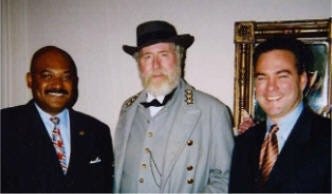None Dared Call This a Coup
Few will remember January 14th, 1998 when Virginia Democrats prevented three Republican delegates from being seated -- and stole the election.
Don’t expect Virginia Democrats rise above principle anytime soon. They never apologized for what they did in 1998. Then again, they never apologized for 1865, either.
If anyone had any doubts about Delegate Bob Marshall (R-Prince William) and his encyclopedic knowledge of Jefferson’s Manual, none were left after the tempestuous 1998 Virginia House of Delegates session.
In many ways, it was the death knell of the old Byrd Machine, of the nearly 150-year stranglehold on Virginia since they ended Reconstruction and inaugurated what they deemed to be progress.
Jim Crow followed by segregation, the exploitation of Virginia’s natural resources followed by an emphasis on critical infrastructure and banking at Norfolk and Richmond only to be overwhelmed and subsumed by Megalopolis. What nobility remained in the Old Dominion succumbed to the myth of Ol’ Virginny just in time to be humbled by South Jersey.
Yet Virginia Democrats clung on.
What used to be the Solid South of the Dixiecrats barely hung on as President Bill Clinton (D-AR) and President of Vice Al Gore (D-TN) could no longer keep the South solid.
As the reins of power began to slip, Democrats found a convenient excuse as to what broke the back of Dixiecrat power — Richard Nixon and the silent majority, Lee Atwater and the Southern Strategy (so called) — yet the old Dixiecrat ethos remained and in many was remains entrenched among Virginia Democrats.
Not only was it able to exercise its revenge on former Governor George Allen in with Senator Jim Webb’s term in office ending as recently as 2012, the recent blackface scandals enveloping both former Democratic Attorney General Mark Herring (D) and former Governor Ralph Northam (D) are all relics of that bygone age.
Former LG Justin Fairfax (D) might have served out Northam’s remaining term if not for a dirty deal cut in order to keep him out of power — public scuttlebutt which everyone in Richmond knows but will never talk about.
Yet the moment where Virginia Democrats finally lost power wasn’t necessarily when Governor George Allen finally broke their permanent occupancy of the Governor’s Mansion in 1993 — momentous as that was. Nor was it when Governor Jim Gilmore repeated with decisive victory in 1997.
The long-term battle which raged through the 1980s and continued after partisan redistricting which savaged the near-majority Virginia Republicans almost accomplished by 1989 were revisited in spades in 2002, when Virginia Republicans ended the careers of many a Virginia Democrat protected by gerrymandered districts looking to avoid the growth of conservative suburbia.
Virginia Republicans in the House set themselves back to work, often in the face of House committees disproportionately stacked against them as Speaker Thomas “Boss” Moss attempted to stave off the inevitable.
By 1998, the Democratic majority was gone.
After the 1997 general election, the Democrats held a 51-48 majority in the House of Delegates with one independent. Republican Governor-elect James Gilmore (1998-2002) appointed two state senators, Joseph B. Benedetti (R) and Charles L. Waddell (D) and one Democratic delegate, David G. Brickley to positions in his administration. The appointments set off a chain-reaction of House and Senate special elections which culminated in the Republicans gaining one additional house seat. With independent delegate Lacey E. Putney agreeing to caucus with Republicans, the chamber would be tied when the session began. However, the State Board of Elections refused to accelerate certification of the Republican delegates elected in three 13 January 1998 special elections, Michelle B. McQuigg, R. Lee Ware, Jr., and Harry B. Blevins.
Thus the race began to have the results of the election ratified by the State Board of Elections in time for the opening of the House Session so as to ensure equal proportion on House committees rather than the 9-3 Democratic control in order to keep Republicans away from power.
So much for democracy, right?
Thus was Marshall able to tie up the House of Delegates in knots as the Clerk of the House was utterly unable to untie the legislative knots of objection upon objection, the motion themselves being non-debatable. Bruce Jamerson initially gaveled the session to recess in order to figure out what to do. Returning that afternoon, Jamerson worked the script — ruling Marshall’s initial objection as out of order and the proceeding to a vote.
Typically, votes for the Speaker of the House were done unanimously, both as a show of Virginia gentility and because the vote was entirely pro forma — the Democrats had already chosen their leadership and there wasn’t much point in contesting the decision. At least, until a split House created the crisis.
Speaker Moss sworn in with cries of “shame!” from the Republican side of the aisle. If you watch the video, you can tell that the Republicans are agitated, not just because Moss and the Virginia Democrats failed to observe due process, but because the consequences of failing to seat three duly elected delegates meant that committee appointments would continue to be stacked 9-3 Democrat — despite the chamber being 50-50.
Thus it was Majority Leader Dick “Dickie” Cranwell (D-Roanoke) who moved into the spotlight and negotiated the truce.
The power sharing agreement hammered out by Cranwell ended the particular sticking point with Virginia’s House Republicans regarding proportional seating, a debate that is still warmly discussed and remembered by those who endured the Democratic stranglehold during the 1990s.
Yet the episode is a contact lesson as to the history of both the Virginia Democratic Party and its legacy of leadership.
Not only is it deeply and inextricably linked with the identity and nature of its 150-year grip on power in Richmond, but to a wider degree on its own perceptions of power and how it must be wielded — whether insurgents within their own party or externally against Republicans in opposition.
Now it is notable that Virgnia Democrats after they lost power were quick to attempt to whitewash their own history. Notably, it was Republicans who became the racists despite the GOP’s long history on civil rights and civil wars. Republicans became the enemies of progress, even though it was in the name of progress that Democrats conducted their affairs through the Jim Crow era and beyond. Republicans somehow became the institution and against reform, even though the Democrats still control the old regimentation while Republicans fight for change such as school choice and education reform.
For all the pretense to democracy and democratic norms, it was Virginia Democrats — present day Democrats — who fought to the bitter end to deny power and representation to the duly elected delegates of the people themselves.
Virginia Republicans would be well served not only to remind our Democratic friends of their old prejudices, but to remind ourselves and one another that we have a legacy in Virginia that is far deeper and more inspiring than we recognize — and far more noble than the political narrative in the press will ever care to admit.
Living up to that reputation and inheritance — what our Founding Fathers believed the Old Dominion could become — is the imperative task of every Virginia Republican.
Ol’ Virginny isn’t dead just because our friends on the left say it is, and especially not when coming from within a party apparatus whose legacy is defined by power rather fair process and fair play. Whether or not that history is something Virginia Democrats truly want to grapple with — and perhaps apologize for — is a question only they can answer as they trample process in the name of progress.
In the meantime, the party of “no” still maintains power in the Virginia State Senate. Whether they maintain it by hook or crook possibly remains on their willingness to do as Cranwell did and compromise for the sake of getting things done.
Yet if history is any indicator? Don’t expect Virginia Democrats to rise above principle anytime soon. They never apologized for what they did in 1998. Then again, they never apologized for 1865, either.
Shaun Kenney is the editor of The Republican Standard, former chairman of the Board of Supervisors for Fluvanna County, and a former executive director of the Republican Party of Virginia.






